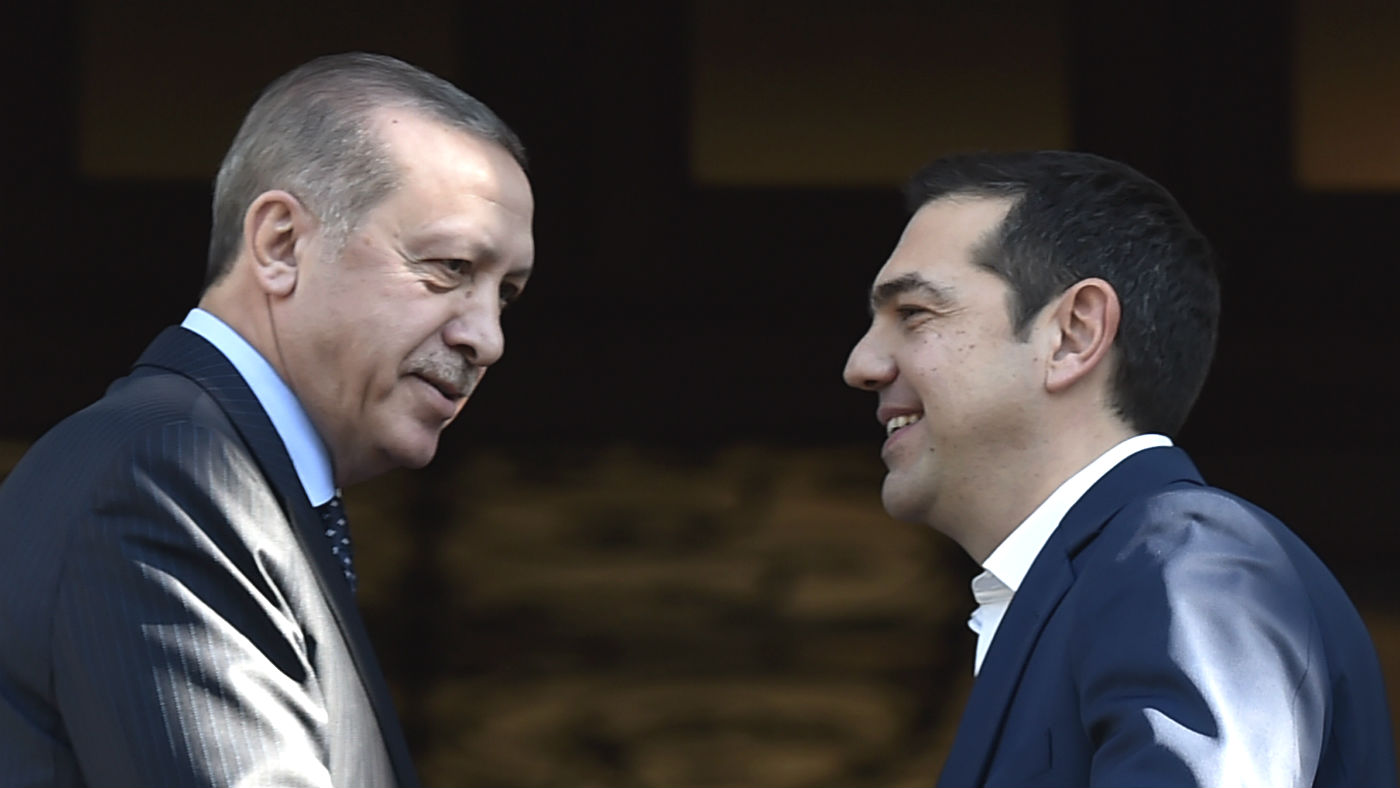Erdogan shoots from hip on historic Greek trip
Long-held grievances surface during first visit by a Turkish president to Greece for 65 years

A free daily email with the biggest news stories of the day – and the best features from TheWeek.com
You are now subscribed
Your newsletter sign-up was successful
The first visit by a Turkish president to Greece in 65 years has exposed long-held grievances and highlighted the divide between the two countries on a host of issues.
Beginning his historic two-day visit in Athens, Turkish President Recep Tayyip Erdogan went on the offensive, attacking the border treaty between Greece and Turkey. He raised the contentious subjects of ethnically divided Cyprus, the rights of Muslim minority in north-eastern Greece and airspace violations.
Just hours earlier, Erdogan had accused Greek Prime Minister Alexis Tsipras of breaking a “personal promise” to extradite eight Turkish servicemen accused of involvement in the failed coup last year.
The Week
Escape your echo chamber. Get the facts behind the news, plus analysis from multiple perspectives.

Sign up for The Week's Free Newsletters
From our morning news briefing to a weekly Good News Newsletter, get the best of The Week delivered directly to your inbox.
From our morning news briefing to a weekly Good News Newsletter, get the best of The Week delivered directly to your inbox.
After giving verbal assurances the men would be sent to Turkey, the Greek government is in a bind. The servicemen have requested political asylum and “EU and Greek law forbids extradition to a country where an alleged offender would be at risk of torture”, says The Times.
Later, in what the BBC described as a “tense” opening exchange, Erdogan said the 1923 Treaty of Lausanne, which set the present-day borders between the two countries after the First World War, was not being applied fairly.
The Treaty is seen as a cornerstone of peace in the region, and Erdogan’s remarks drew a sharp rebuke from Tspiras and Greek President Prokopis Pavlopoulos.
“The Treaty of Lausanne defines the territory and the sovereignty of Greece, and of the European Union, and this treaty is non-negotiable,” Pavlopoulos said, “it has no flaws, it does not need to be reviewed, or updated.”
A free daily email with the biggest news stories of the day – and the best features from TheWeek.com
The visit, which was meant to reset bilateral relations, has led to angry protests from left-wing Greeks and exiled Kurds, alarmed by Turkey’s growing bellicosity and a domestic crackdown on the oppostion since last year’s failed coup.
The two countries, nominally allies in Nato, have clashed on many occasions since Greece gained independence from the Ottoman Empire in 1830. They almost went to war in 1996 over a group of uninhabited islands in the Aegean Sea and have been locked in an uneasy ceasefire in Cyprus since the 1970s.
Although relations have improved in recent years, Reuters says “many Greeks believe Turkey has territorial aspirations against their country”.
Yet despite their uneasy history “the Greeks are acutely aware that geography means they must coexist with Turkey and stand to benefit most if Ankara remains anchored to Europe”, says The Guardian.
Both governments hope the visit will mark a new chapter in bilateral relations, with joint infrastructure projects being signed off, the BBC’s Mark Lowen reports from Athens.
Konstantinos Filis, research director of the Athens-based Institute of International Relations, told DW that “economic and security issues will be the focus of the visit” and “controversial topics will be ignored.”
However, Thanos Dokos, director of the Athens-based Hellenic Foundation for European and Foreign Policy think tank, said he did not expect meaningful political progress between the two Mediterranean countries, dismissing the much-vaunted visit as “a public relations exercise and photo opportunity”.
-
 How the FCC’s ‘equal time’ rule works
How the FCC’s ‘equal time’ rule worksIn the Spotlight The law is at the heart of the Colbert-CBS conflict
-
 What is the endgame in the DHS shutdown?
What is the endgame in the DHS shutdown?Today’s Big Question Democrats want to rein in ICE’s immigration crackdown
-
 ‘Poor time management isn’t just an inconvenience’
‘Poor time management isn’t just an inconvenience’Instant Opinion Opinion, comment and editorials of the day
-
 Epstein files topple law CEO, roil UK government
Epstein files topple law CEO, roil UK governmentSpeed Read Peter Mandelson, Britain’s former ambassador to the US, is caught up in the scandal
-
 Iran and US prepare to meet after skirmishes
Iran and US prepare to meet after skirmishesSpeed Read The incident comes amid heightened tensions in the Middle East
-
 Grok in the crosshairs as EU launches deepfake porn probe
Grok in the crosshairs as EU launches deepfake porn probeIN THE SPOTLIGHT The European Union has officially begun investigating Elon Musk’s proprietary AI, as regulators zero in on Grok’s porn problem and its impact continent-wide
-
 Israel retrieves final hostage’s body from Gaza
Israel retrieves final hostage’s body from GazaSpeed Read The 24-year-old police officer was killed during the initial Hamas attack
-
 China’s Xi targets top general in growing purge
China’s Xi targets top general in growing purgeSpeed Read Zhang Youxia is being investigated over ‘grave violations’ of the law
-
 Panama and Canada are negotiating over a crucial copper mine
Panama and Canada are negotiating over a crucial copper mineIn the Spotlight Panama is set to make a final decision on the mine this summer
-
 Trump backs off Greenland threats, declares ‘deal’
Trump backs off Greenland threats, declares ‘deal’Speed Read Trump and NATO have ‘formed the framework for a future deal,’ the president claimed
-
 Europe moves troops to Greenland as Trump fixates
Europe moves troops to Greenland as Trump fixatesSpeed Read Foreign ministers of Greenland and Denmark met at the White House yesterday